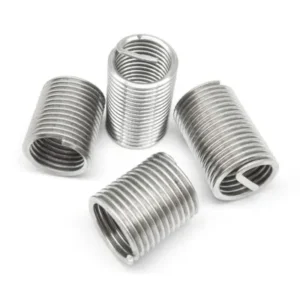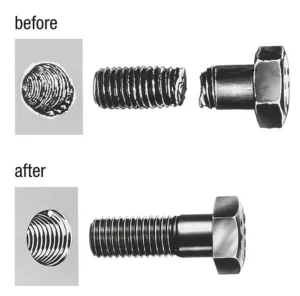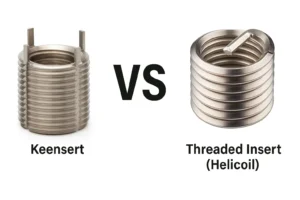How to Choose Rivet Nuts for Thick Material?
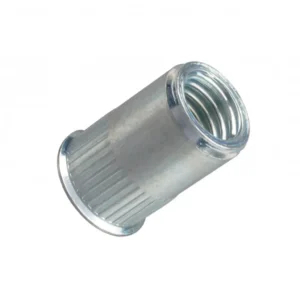
Leading Rivet Nut Manufacturer and Supplier in China
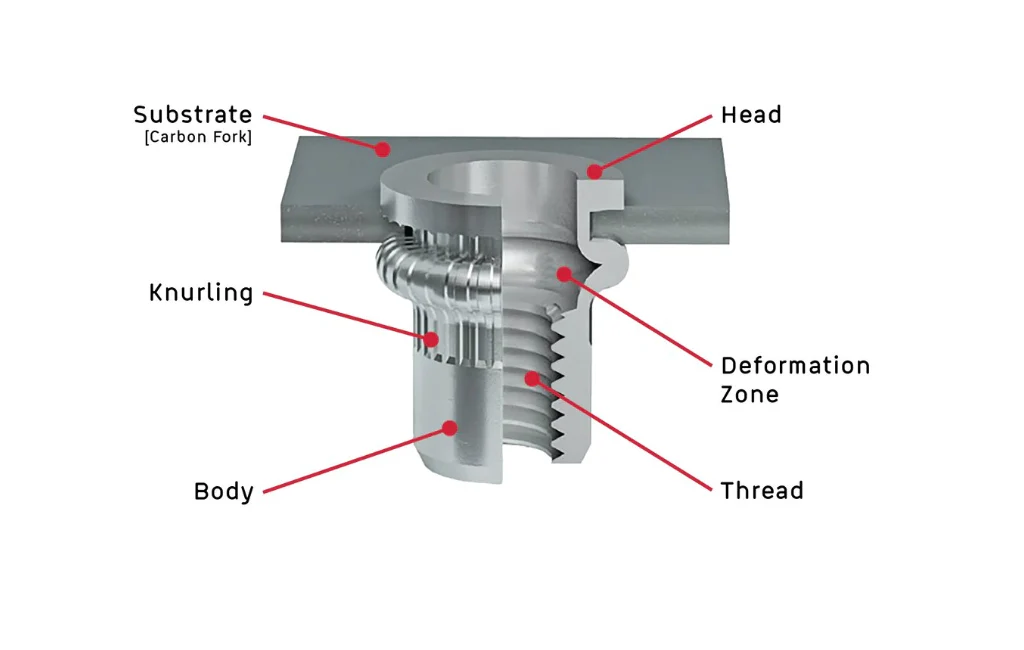
Rivet nuts offer a versatile and effective solution for creating strong, load-bearing threads in these materials. However, choosing the right rivet nuts for thick material requires careful consideration of several factors to ensure optimal performance and durability. In this guide, we’ll explore the key aspects to keep in mind when selecting rivet nuts for thick applications, helping you make an informed decision for your next project.
Table of Contents
Why Use Rivet Nuts for Rivet Materials?
1. Provide a strong connection: rivet nut can create a strong threaded connection in different types of materials, so that they can withstand large tensile and shear forces. Whether in metal plates, plastic housing or wood materials, rivet nuts ensure the long-term reliability of the connection.
2. Suitable for a variety of materials: rivet nuts are suitable for a variety of materials. Including metals (such as steel, aluminum, stainless steel), plastics, wood, etc. Widely used in automotive, aviation, construction, electronic products and furniture manufacturing and other fields. Different materials of rivets and nuts can provide different strength and durability to meet the needs of various projects.
3. No need for two-sided operation: Different from the traditional screw connection, the rivet nut is usually installed on one side. This means that the installation can be completed by simply operating on one side of the material. This makes it ideal for structures that cannot be operated from both sides. For example, installation in limited space or where quick installation is required.
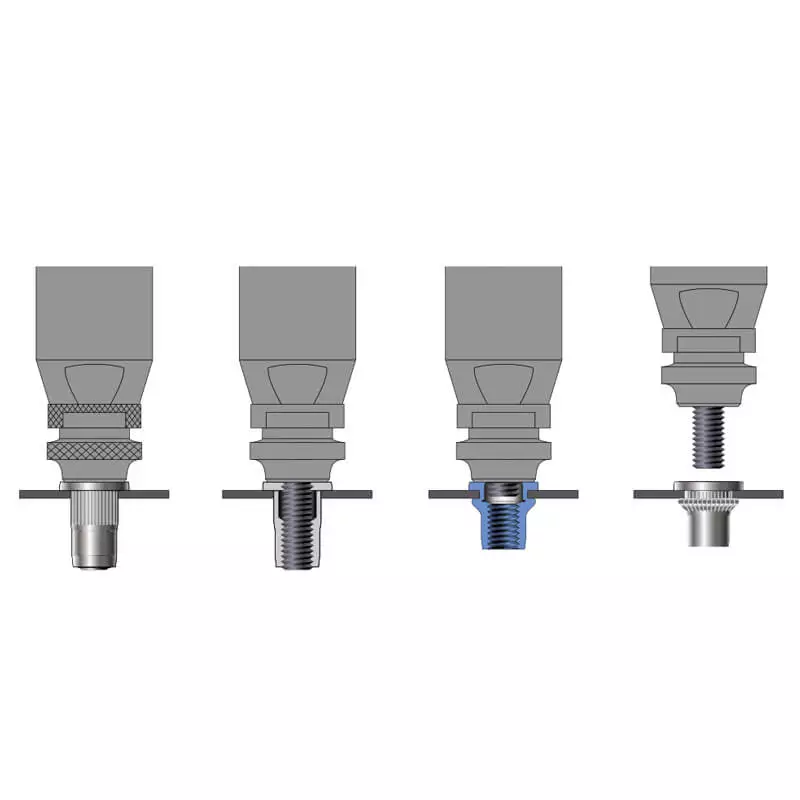
4. High load and high vibration resistance: rivets and nuts have excellent tensile strength and shear strength, and can withstand high load and high vibration environment. This makes it ideal for applications in automotive, machinery, construction and other areas that require strong support and stability. Especially in dynamic or vibrating environments.
5. Space saving: The compact design of the rivets and nuts enables them to function in space-constrained environments. Especially suitable for applications where large size bolts and nuts cannot be accommodated. Compared with the traditional screw connection method, the rivet nut saves installation space. It also provides higher installation efficiency without compromising connection strength.
6. Beautiful and neat: The appearance of rivets and nuts is usually more tidy and low-key, which can provide a more exquisite visual effect for the product. Avoid protruding parts or irregular connection points that occur when conventional screws are installed.
How Thick of Material Can You Use a Rivet Nut On?
The thickness of the rivet nut depends on the type of material, the specification and design of the rivet nut. Standard thickness range of rivet nuts: In general, the applicable material thickness of rivet nuts is usually between 0.5mm and 12mm. It depends on the type of nut used (standard rivet nut or blind rivet nut) and the strength and density of the material.
Therefore, the selection of the appropriate specification of the rivet nut needs to be adjusted according to the material thickness and use requirements to ensure that it is firmly installed and can withstand the expected load.
Metal Material
Aluminum: Generally, the thickness of the rivet nut can be used in the range of 0.5mm to 6mm, depending on the specification and material of the rivet nut.
Steel: Usually suitable for a thickness of 0.8mm to 10mm, thicker steel plates may require larger rivets and nuts or multiple mounting points to distribute the load.
Stainless steel: suitable for thicknesses from 1mm to 8mm. Stainless steel material because of its higher strength, can be used for thicker materials.
Plastic Material
Suitable for plastic materials from 1mm to 6mm. According to different types of plastic (such as ABS, polycarbonate, etc.), the choice of rivet nuts will also be different.
Timber
When we consider the use of rivet nuts for thick material, wood is a common scene. In general, rivet nuts can be used for wood from 2mm to 12mm. For thinner wood (such as pine), it is necessary to choose the appropriate rivet nut size to avoid cracking the wood.
Composite materials (such as carbon fiber, fiber reinforced plastics, etc.)
Usually suitable for 2mm to 8mm composite materials, the use of composite materials requires special selection of high-strength rivets and nuts to ensure the fastness of the connection.
How to Choose Rivet Nuts for Thick Material?
1. Type
- Large flange rivet nuts:Such as countersunk rivet nut. This type of rivet nut has a larger head to provide better load distribution. Suitable for thick materials to prevent rivet nuts from pulling the material during installation.
- Heavy-duty rivet nuts:For thicker, harder materials, you can choose high strength rivet nuts. The internal threads and housing materials of these rivet nuts are usually specially treated to provide better tensile and shear resistance.
2. Materials
- Stainless Steel:Stainless steel rivet nuts are suitable for corrosive environment, with high corrosion resistance and strength. They are suitable for some thicker and special anti-corrosion materials.
- Alloy Steel:In applications where high strength is required, alloy steel can provide increased tensile strength and durability.
- Carbon Steel:Carbon steel rivet nut is a conomical option for thick material connections with less load.
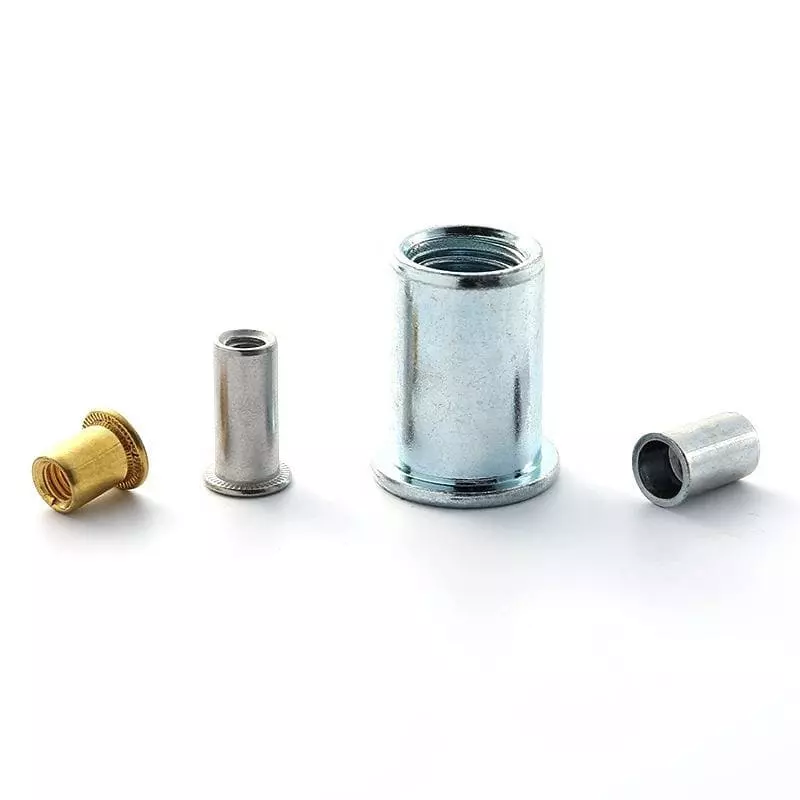
4. Installation Tools
For thick materials, using the right installation tool is crucial. Hydraulic or pneumatic tools are recommended. They provide enough force to install and secure the rivet nut properly.
5. Load Requirements
Choose rivet nuts based on specific load needs. For heavy loads, select those with high tensile and shear strength. Generally, larger thread sizes offer higher load-bearing capacity.
Conclusion
- For thick materials, use high-strength, large flange rivet nuts and proper installation tools.
- Ensure thread size and hole diameter match for maximum connection strength and durability.
- If needed, provide material and application details for a more tailored recommendation.
Do You Have Any Questions?
Let Us Solve Your Problem
How do You Ensure that Rivet Nuts will Securely Clamp Thick Materials?
1.Ensure Proper Hole Size and Alignment for Optimal Expansion and Secure Installation
The hole size must match the rivet nut’s outer diameter, typically with a slight tolerance to allow the rivet nut to expand properly when installed. If the hole is too small, the rivet nut may not expand fully, leading to poor clamping. If the hole is too large, the rivet nut may not seat properly, resulting in insufficient grip. Hole alignment should be precise to ensure the rivet nut expands uniformly, creating a tight and secure fit.
2. Use Hydraulic or Pneumatic Tools for Consistent, High-Pressure Installation to Securely Clamp the Rivet Nut
Manual installation may not provide enough force to securely clamp a rivet nut in thick materials. Hydraulic and pneumatic tools ensure the rivet nut is installed with consistent, high pressure, causing the nut to expand properly and clamp tightly to the material. These tools also ensure uniform installation across multiple rivet nuts, preventing variations in clamping force that could lead to weak connections.
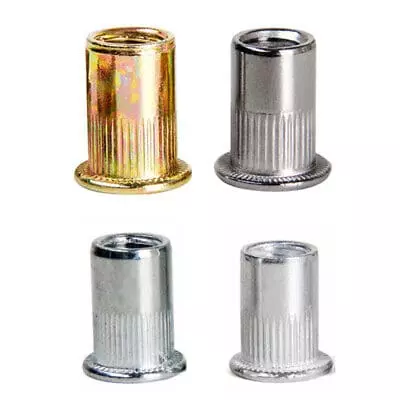
3. Select Materials That Match the Strength and Corrosion Resistance Required for the Application
When choosing rivet nuts, consider the material of the rivet nut itself. It must match the application’s strength and environmental conditions. For instance, stainless steel or alloy steel rivet nuts offer higher tensile strength and corrosion resistance. It making them ideal for outdoor or harsh environments. For applications in corrosive environments, materials like galvanized steel or stainless steel are highly recommended to prevent rust or degradation over time.
4. Test the Assembly Under Load Conditions to Verify the Rivet Nut’s Secure Performance
After installing rivet nuts, it’s essential to test the assembly under load conditions to ensure that the rivet nuts hold securely. This can be done by applying a load that simulates the real-world conditions the rivet nut will face. Testing ensures that the rivet nut doesn’t loosen, pull out, or fail under pressure, confirming that the clamping is effective and long-lasting.
Steel, Stainless Steel or Aluminum- - What Kind of Thicker Material is More Suitable for High Strength Requirements?
1. Steel
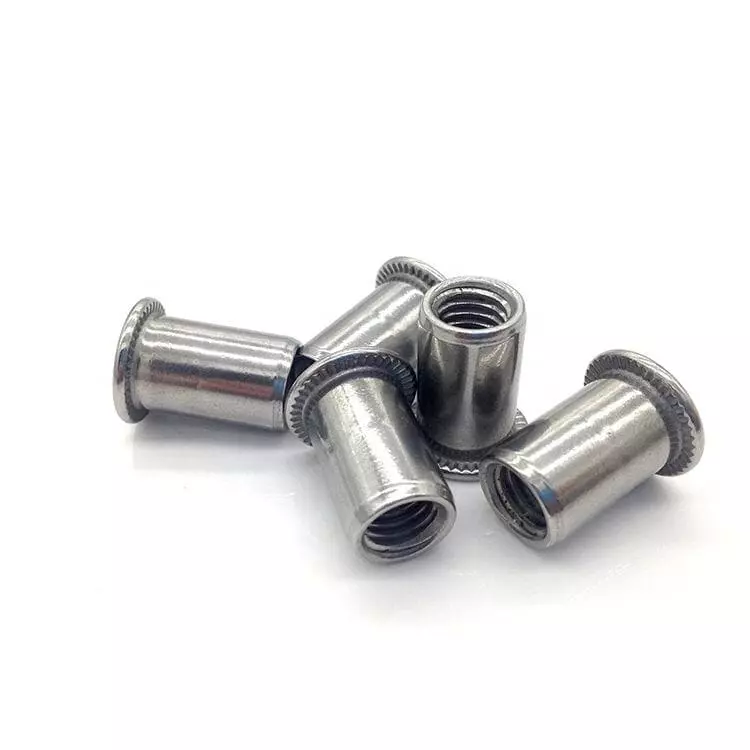
Steel is widely used for applications requiring high strength due to its superior tensile and shear strength. Carbon steel, particularly high-carbon grades, offers excellent mechanical properties for heavy-duty applications. Steel’s strength can be further enhanced with heat treatment processes such as quenching and tempering.
It is cost-effective compared to stainless steel and offers great durability under high load conditions. However, steel is prone to corrosion and may require additional protection like coatings or galvanizing.
2. Stainless Steel
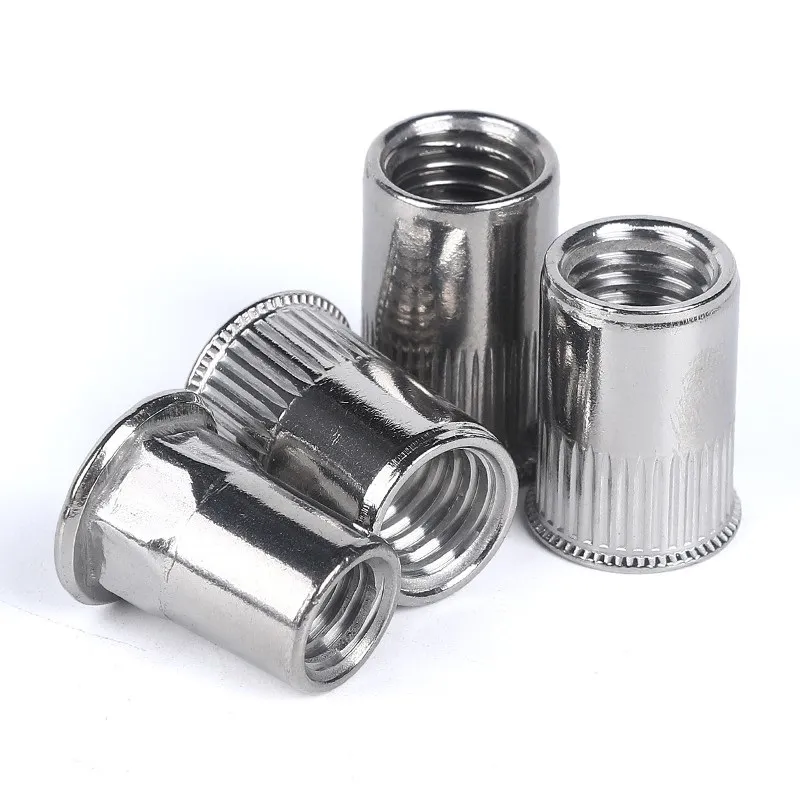
Stainless steel is highly resistant to corrosion, making it suitable for harsh environments. It offers a combination of strength and corrosion resistance that steel alone cannot match.
For applications in corrosive environments or where hygiene is essential, stainless steel is often preferred. It is ideal for industries such as food processing, chemical handling, and marine applications. Stainless steel’s higher cost compared to carbon steel is justified by its longer lifespan and corrosion resistance.
3. Aluminum
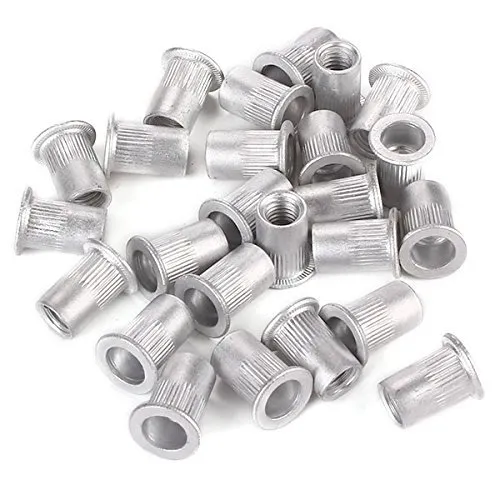
Aluminum is lightweight, making it an excellent choice where weight is a critical factor, despite lower strength. Although aluminum is less strong than steel, high-strength alloys like 7000-series offer enhanced performance.
Aluminum is resistant to corrosion, especially with anodized or coated finishes. Its strength-to-weight ratio makes it ideal for aerospace and automotive applications. However, aluminum has a lower shear strength than steel and may not perform as well under extreme loads. For applications with moderate strength requirements and weight constraints, aluminum is a good option.
What are the Limitations of Rivet nut?
Rivet nuts are highly versatile fasteners, but they do have some limitations. Here are the key ones.
- While rivet nuts are versatile and efficient, their limitations include load capacity, surface constraints, and installation challenges.
- It’s important to assess the specific application requirements to determine if a rivet nut is the best solution.
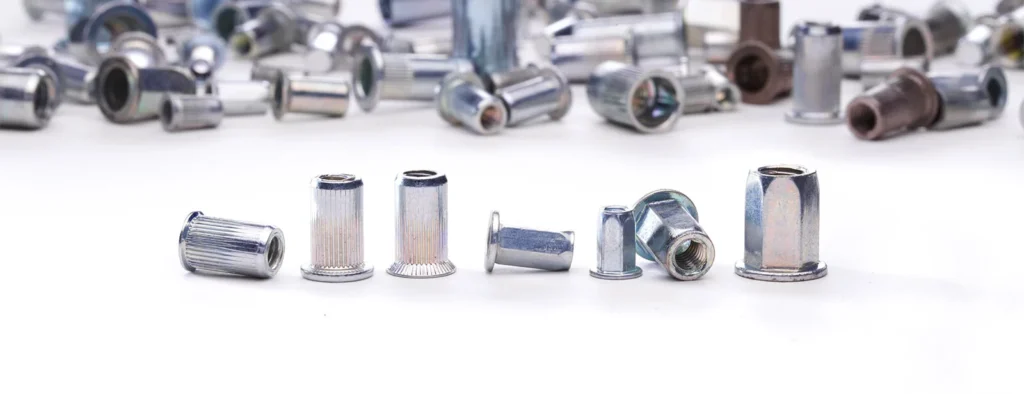
- Limited Load Capacity: Rivet nuts generally cannot handle extremely high loads compared to other fasteners like bolts or welded joints. They are best suited for medium-load applications; excessive loads can cause them to fail or pull out.
- Material and Surface Constraints: Rivet nuts may not be effective in very thin or soft materials, where they can pull through or cause deformation. For thicker materials, a larger rivet nut or a different fastening solution may be necessary.
- Risk of Over-tightening: Over-tightening the fastener can damage the rivet nut or the material, leading to a weak or unreliable joint. Careful torque control is necessary during installation, which can be time-consuming.
- Corrosion Concerns: Rivet nuts made from standard steel can be prone to rust and corrosion if not properly coated or treated. Stainless steel rivet nuts are more resistant but come at a higher cost.
- Limited Reusability: Rivet nuts are generally single-use fasteners. Once installed, they are not easily removable or reusable without damaging the material. For applications where disassembly and reassembly are frequent, alternative fastening solutions may be more suitable.
Conclusion of Rivet Nuts for Thick Material
In conclusion, selecting the right rivet nuts for thick materials is crucial for ensuring a secure and durable fastening solution. Consider factors such as material thickness, load requirements, and environmental conditions when choosing your rivet nut.
Opt for high-quality, corrosion-resistant options like stainless steel rivet nut for added longevity. By paying attention to the installation method, proper tooling, and rivet nut specifications, you can enhance the performance of your project and achieve reliable, long-lasting results. Whether for heavy-duty applications or specialized uses, choosing the right rivet nut ensures strength, stability, and peace of mind.
Do You Have Any Questions?
Let Us Solve Your Problem

At Rivetfix, we are dedicated to providing premium rivet nuts tailored to meet the diverse needs of our clients. Our range of rivet nuts offers unmatched strength, reliability, and versatility across industries like automotive, aerospace, construction, and woodworking. Whether you need lightweight aluminum rivet nuts, corrosion-resistant stainless steel, or high-strength steel options, Rivetfix ensures a perfect fit for your project. Our rivet nuts are designed to provide secure, lasting connections that stand up to the toughest conditions, from high loads to vibrations and extreme environments.
As a leading fastener manufacturer in China with more than 15 years in the industry, Rivetfix are committed to providing first-class quality fasteners and responsive services to the world. We can select the most suitable fasteners according to your project needs, and provide product customization services.
Contact us for project advice and the latest rivet nut quote!
Get High Quality Rivet Nuts Quote!
Send Your Rivet Nut Request
For more than 20 years, Rivetfix has helped customers solve many rivet nuts sourcing needs and technical challenges.
Have a question? Contact us and we’ll provide you with the perfect solution.

